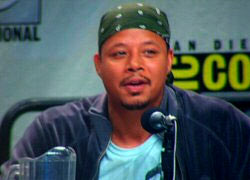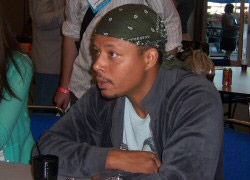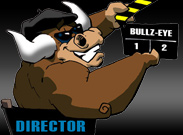
Comic-Con: Roundtable with Terrence Howard
08/07/2007
Movies Home / Entertainment Channel
ALSO: Check out our interviews with Iron Man co-stars Gwyneth Paltrow and Robert Downey Jr and director Jon Favreau.
When we last spoke with Terrence Howard, the up-and-coming actor
was too busy making a name for himself in small indie flicks, like
“Crash” and “Hustle & Flow,” to even consider appearing in a comic
book movie. Oh how things change. It's been two years since our chat,
and in that time Terrence has been nominated for an Oscar, skimped
down to his skivvies to play motivational swim coach Jim Ellis and
nabbed a supporting role in the big-screen adaptation of “Iron Man.”
On his first trip to Comic-Con to promote the new film, Terrence sat
down with a group of writers to discuss the differences between working
on an indie and a big budget movie, his first time in front of a green
screen, and the experience of going up in an F-16.
Terrence Howard: (walking over to our table)
Duhn duhn duhn…
Reporter: So are you a fan of Jon and his movies, and if so, what do you see in this superhero comic book and the response of the lack of heroism today?
TH: Well, you got to remember, when Stan Lee first introduced the Iron Man character in the ‘70s, it was at a time when the world was in social upheaval because of a lack of accountability with the government – the lack of moral judgment with how smaller countries were being treated. And here you had a man that wanted to stand up and make a difference. Someone who could benefit or profit from it, said “No, I don't want to profit at the cost of losing humanity.” So, yeah, I think these are the only ways you can make statements against the government that will be lasting, that might have an impact, because children will watch it and know that certain things are not acceptable. Certain times, somebody has to stand up. It's like that song by Kenny Rogers, “The Coward of the County?” Sometimes you have to fight when you're a man, and that's what I love about Iron Man, because he decides to stand up and fight.
Reporter: Do you think it's a movie that will do okay with the kids?
TH: Oh, it's going to… even with the action. You know, they have to, because this is really the only superhero that any child can become (Editor's Note: Terrence obviously didn't mean that, since there are plenty of other superpower-less characters in comic lore). With the X-Men, you had to be born with that mutant gene. With the Avengers, you had to have flown through that cosmic cloud (Editor's Note: Again, Terrence is confused. It was the Fantastic Four, not the Avengers). But anyone at this table that has the ingenuity or the imagination to sit up and say “You know, I'm going to run some electrodes through a suit, I'm gonna create a compulsor ray” – which, you know, is just taking electromagnetic fields and reversing it, and catching it at the stage where it becomes light, where right before the light blends in with it – this is the road where any scientist, any child that wants to become a scientist, can create this suit. We can all be Iron Man.
Reporter: They gave you a really great character in that the character that you're playing is really a leading man to himself. You're playing a character that can carry an entire movie. That had to be great. How did you feel about that?
TH: Oh, man. And then I only had to work a couple days on this movie, (laughs) because most of this is about Tony Stark, but the implications of me being able to go and put on the suit and war with Tony Stark, and go crazy, and then to have my own suit made, and then to run and fight with the Avengers, you know…
Reporter: How much of that is set up with this movie?
TH: Everything is pending on how this movie is received, and judging from being here at Comic-Con, I think this movie's going to do well. But we've got a hurdle to get over. “Transformers” was the bomb, “300” was the bomb. It's a new age for sci-fi and special effects, and we've got to match that. Fortunately, we get to come out a year later, so, and we haven't gone to doing those special effects yet. I think we're going to do well. I mean, we're going to really well.
Reporter: Do you think special effects get in the way?
TH: No! ‘Cause it's all special effects in the mind. It's all, we're wishing, we're pretending to feel something that we actually start to feel, but don't get to see. And now, the audience, we have help. I don't have to pretend that we're looking over here, and hope that the audience catches this motion on stage that I'm watching lilacs fly across the sky. We can actually turn to it and the audience can feel with me, so you actually do less when you have special effects, than when you don't have them. You do less when you have CGI, because you have the imagination of the CGI experts, of the director, to fill it in.
Reporter: You feel like a kid, when…
 TH: Oh, please. A kid that could drive. They put me
in that R-8, they put me in that F-16 and, I mean, I got
to fly, dude. I got to take off and fly and had a wingman right here.
I got to go up a ton of times. I got to throw up eight, nine times.
TH: Oh, please. A kid that could drive. They put me
in that R-8, they put me in that F-16 and, I mean, I got
to fly, dude. I got to take off and fly and had a wingman right here.
I got to go up a ton of times. I got to throw up eight, nine times.
Reporter: I've heard they really make the Air Force look like rock stars in this movie.
TH: The Air Force -- I had never been a fan of armed forces -- I was always a fan of an archaic society and barbarism, I just liked the idea of everyone standing on their own. But then the cadence that these people live by, the honor, it means something.
Reporter: You were joking on stage about working on a film that now had a budget. Were there any mind-blowing moments for you in coming from something like “Hustle & Flow” to “Iron Man?”
TH: When we had the entire Air Force base, we didn't have to put a couple cops in a uniform, a couple actors in a uniform, and to shoot in a B-1, to actually use F-22s in the shooting, that was hit. They could spend $10 million in one day. “Crash” and “Hustle & Flow,” together, cost $9 million to make. And we spent that in one day.
Reporter: Did you have to do any green screen acting or anything like that?
TH: Unfortunately, yes.
Reporter: Is it really hard to do?
TH: No, it's easy. It's easy, because now it's just you. It's like Beethoven said, “When you create music, and you play music, and someone's listening to it, you've drawn the audience into your heart.” So as an actor, on there with a green screen, I've got an entire orchestra of light and possibilities.
Bullz-Eye: You mentioned going into the sky on an F-16, but I also heard that you got to shoot some pretty big guns.
TH: Yes, um, M-50s, where the bullets are this big (spreads his fingers about six inches apart) I mean, literally it's large, if I shot this door it'd fall off. And they let me use live rounds. So, you're in the middle of the desert shooting something 300 yards away and watch it go to pieces. A bus – being able to split a bus all the way down, from 300 yards away. Dude, that was hit.







